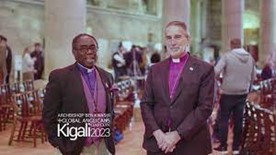On 17 April, around 125 Anglicans from Great Britain and continental Europe will join well over 1000 delegates from other regions around the world in Kigali, Rwanda, for the fourth Global Anglican Future Conference. We’ll be meeting in the city’s main convention centre and will be accommodated in large hotels nearby. During the conference, which will be hosted by Laurent Mbanda, Archbishop of the Anglican Province of Rwanda, speakers from different countries will give expositions from the bible, and updates on how local Anglican churches and organisations are contending for the faith and moving forward in mission. There will be time for worshipping together, and discussion and prayer in small groups, both with fellow delegates from our own region, and with brothers and sisters from other countries. There will be a chance to find out more about Rwanda as a nation and the Rwandan church – topics on which delegates received an introductory briefing on 27th March. The conference will conclude with two important moments: the photograph of all the delegates together, and the reading and endorsement of the Conference Statement.

What has Gafcon achieved up till now? There is no doubt that this movement has been of historic significance in the global church. The ‘old world’ leadership of Anglicanism, based in England and North America, has moved away from a clear bible-based confession in their understanding of Christian faith, and has been influenced more and more by contemporary secular ideologies. At the same time, the church’s influence in the global north and north-west has shrunk as numbers attending church have declined. Meanwhile, Anglicanism has grown rapidly in the global South and south-east, and its positive influence in wider society is increasing.
Some Anglican leaders, either through theological conviction or a desire for peace at all costs, have tried to minimise the differences between the ‘liberal’ and ‘conservative’ understandings of Christian faith and Anglicanism. They have attempted to persuade global south conservatives to accept revisionist theology, for example new ‘progressive’ Western understandings of sex, marriage and family, as legitimate diversity within Anglicanism. Gafcon has led the way in refusing to do this. Not only is it contrary to “the faith once delivered to the saints”, but it is a continuation of a colonialist mindset, where the rich countries of the north believe they can dictate to others what they can think and do.
Since its inception in 2008, Gafcon has represented a development from the earlier coalitions of global south Anglicans. Previously, bishops, theologians and recognised mission leaders had worked effectively together, for example at Lambeth 1998 and in other smaller gatherings, to produce clear statements, warning against revisionist interpretations and re-stating orthodox biblical faith. Gafcon recognised that these meetings needed to be widened to include ‘ordinary’ clergy and laity, and that there needed to be a new Anglican movement, down to the grassroots, based on agreed fundamentals of doctrine, as a basis for re-commitment to the shared mission of global evangelisation and disciple-making.

Gafcon also took the step, still seen as radical by some, of coming to the aid of those faithful Anglicans who have found themselves under the oversight not just of individual rogue bishops, but of an ecclesial system which had now departed from the biblical faith as an institution. In such cases, making statements of orthodoxy and giving moral support from a distance is not enough. It has been necessary to provide a new home – by creating and recognising new Anglican jurisdictions, under the godly oversight of Anglican Primates committed to the biblical gospel. This happened first in the US and Canada, then in Brazil, New Zealand, Great Britain and Europe, and most recently, Australia.
As we gather in Kigali, the conference will take place in the context of the recent decision of the General Synod of the ‘Mother Church’ of the Anglican Communion, to approve in principle the blessing of same sex relationships in church.
Canterbury Cathedral is still considered by many to be the ‘mother church’ of the Anglican Communion.
Given the strong negative response that this has elicited around the world, and the particular difficulties which now face biblically faithful Anglicans in the Church of England, it is important that the conference organisers, while acknowledging this new reality as it affects the whole Communion and addressing it an appropriate way, do not allow internal Church of England politics to dominate the conference.
Instead, here are some suggestions for what can be achieved at Gafcon IV:
- The source of the church’s authority is reaffirmed:
Gafcon can explain again, as it has done in previous conferences, that authentic Anglican Christianity looks to Christ as its ultimate head, and Scripture as the controlling guide, basing our distinctives on the historic formularies. Connection with the current Canterbury structures, church traditions, and the latest thinking of human reason are secondary authorities at best, and can at worst promote a different ‘gospel’.
- The purpose of the church is celebrated:
Gafcon can issue a rallying call again, to prioritise preaching the gospel of salvation and making disciples of all nations. In order to avoid being distracted or co-opted by the agendas of the world, some of which are immoral or concerned only for money and power, the faithful church cannot retreat into a bubble of ‘churchianity’, but must listen carefully to the world’s messages in order to identify and oppose what is false, and discern what can be redeemed by the gospel. At the same time, the church does not close its ears and eyes to the pain of the needy, but acts as directed by Christ in each context.
- The unity of the church is displayed:
The five-yearly global gatherings of Gafcon are an opportunity to experience and display the miracle of diverse races and cultures united as God’s children, saved by the blood of Christ and raised to new life, worshipping, learning and praying together. There are many historic tension points which need to be resolved, only if humility and love replaces pride, anger and self-seeking.
- The unity of the church is structured:
Is Gafcon a renewal movement within the existing structures, or a catalyst for new structures which have become necessary? Different organisations have emerged, united in shared commitment to biblical truth but representing different strategic approaches, for example, on a global level, Gafcon / GSFA; and in England, those committed to working within the Canterbury structure (CEEC) and those who have left (ANiE). The aim should be that the biblically orthodox within the Anglican Communion should be structurally differentiated from those who advocate a different gospel. This means, in practical terms, a convergence of Gafcon and GSFA, so it would be good to see moves towards this goal in Kigali.
- The mission of the church is resourced:
As the church grows rapidly especially in the global south, there is increasing need for focus on training of current and future leaders, especially enabling local churches to make disciples who can minister in contexts of oppression and persecution by non-Christian religions and ideologies, extreme poverty and natural disasters. The building of a loose coalition of the orthodox into more formal structures, such as inter-provincial councils and networks, will need resources and good management.
Please pray for the conference!
More resources on Gafcon and the future of the Anglican Communion:
The official website of the conference, with background on Gafcon, details of the programme, how to access the livestream and other resources, is now live at https://gafcon23.org

Video preview: Archbishop Ben Kwashi, General Secretary of Gafcon, explains what will happen at the conference with typical enthusiasm!
Click here for video
The Anglican Communion Realignment: full steam ahead, by Phil Ashey, American Anglican Council
Toward reviving, reforming and reordering the Anglican Communion: Fourteen Theses for Global Anglicans, by Stephen Noll
Over the past few months, the newsletter editorials have reflected on the 14 articles of the Jerusalem Declaration. We have now brought these studies together on our website here and in PDF form on the Anglican Mainstream website here.